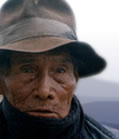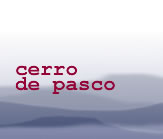 |
 |
||
 |
|||
|
RELATED THEMES employment and income identity social change OTHER LOCAL THEMES BACKGROUND |
community activities
Several narrators make the point that when mining took over as the primary source of employment, its influence on communities was more than economic. The shift to individual contracts and salaried employment undermined the community focus and commitment of farming life. The change in outlook was compounded by the strict timetables and inward-looking working culture of the mines. "[Miners] think of the present and that's all, as they say, they think about their money, about their work and that's all. They're trapped by their surroundings" (Peru 14). Some communities retain their collective traditions, but in those areas where more people were employed in mining than in farming "the solidarity of before no longer existed. nobody needed the faena (communal tasks) - that was a change" (Peru 8). One communal activity, which had a strong social element, was all but destroyed by the by-products of the mining industry: "There are things that are no longer customary around here, for example.the faenas (communal work) of the women washing their clothes on Sundays, a delightful custom that [I remember] from when I was a child... On Sundays families would go down to the river señor with all their clothes to wash. But that's when the waters were clean. They would spend the whole day there doing their washing, everyone would help each other out, everybody would be partying. They'd.cook their traditional dish, pachamanca (meat and vegetables cooked in clay ovens underneath the soil), and they'd celebrate with their maize wine.... Everybody was happy then, some people used to fish... It was really beautiful, señor. Not nowadays, no, because no one wants to wash their clothes in the river - the river is pure filth" (Peru 3). Yet although communal ownership and activities have to some extent been superseded by other ways of working and employment, communities retain pride in their collective traditions. And despite the polluted environment, livestock are still kept and with them, some of the old ways of working: "We have our traditions in Rancas. When the land is divided up we all work with a common principle, like a law, we have to comply with. All land is communal. When a family is formed they become comuneros, members of the community, and they raise cattle." (Peru 26) Being a comunero is still very much a living tradition, and the comuneros' rights and responsibilities are inextricably linked to communal activities: "[Being a comunero] means to belong to a community. To have land. To work the land. To help with the communal work, to do the work of everybody. To contribute to the maintenance of the community livestock and crops. To respect the authorities. This is what being a good comunero is all about" (Peru 4). quotes about community activities"The solidarity of before no longer existed.It had been lost completely, not like before. Before it was a campesino organisation - this had all stopped. [The cause?] Well, mainly the Centromin Cobriza [mining] company where people earned money. I think [money] is like a god which nobody needs. Now the idea of 'you help me today and I'll help you tomorrow' has completely gone.. You have to look for money, it's money everybody wants." "Here, an estancia is a place a family has on community land. It's not necessarily where the family actually lives. It's a dwelling or hut with pasture lands around it and it's near a river or a spring which is also used collectively. And I emphasise that this land doesn't belong to the farmer, and the land is not fenced, so the livestock move around, though there is no danger of confusion because each little animal can be identified by the colours on its ribbon, by the paint. All the land belongs to the campesina community.." ".your duty [as a comunero] is to look after the heritage of the community and take part in the communal activity, be that communal work (faenas) or the voluntary minka or washka. Minka is work where everyone lends everybody else a hand. For example, I'll help out my neighbour X to finish job X, and they'll then help me to do whatever work I need to do be it digging a ditch, or even to take care of my sheep, shearing ... and it doesn't cost anything, You might just pay by giving them food and drink, some chicha (maize drink) perhaps. Washka is the same as minka. they say washka round here.it means to work together to get something done." "I would follow my father to learn about work together in the community faena, in the harvest of potatoes, barley, which was done completely by the community... once the barley is harvested, the next day [we had] to thresh the tremendous heaps of barley for the community. another thing that was very beautiful was the potato harvest because a group of women prepared boiled potatoes in the farm and would take chillies and cheese to share with everyone; that would be shared as a demonstration of the brotherhood that existed in our village. There was a lot of unity and those who skipped the faenas or did not attend without justification were sanctioned." |
|